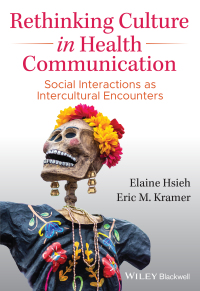Buy Rethinking Culture in Health Communication: Social Interactions as Intercultural Encounters 1st Edition PDF ebook by author Elaine Hsieh; Eric M. Kramer – published by Wiley-Blackwell in 2021 and save up to 80% compared to the print version of this textbook. With PDF version of this textbook, not only save you money, you can also highlight, add text, underline add post-it notes, bookmarks to pages, instantly search for the major terms or chapter titles, etc.
You can search our site for other versions of the Rethinking Culture in Health Communication: Social Interactions as Intercultural Encounters 1st Edition PDF ebook. You can also search for others PDF ebooks from publisher Wiley-Blackwell, as well as from your favorite authors. We have thousands of online textbooks and course materials (mostly in PDF) that you can download immediately after purchase.
Note: e-textBooks do not come with access codes, CDs/DVDs, workbooks, and other supplemental items.
eBook Details:
Full title: Rethinking Culture in Health Communication: Social Interactions as Intercultural Encounters 1st Edition
Edition: 1st
Copyright year: 2021
Publisher: Wiley-Blackwell
Author: Elaine Hsieh; Eric M. Kramer
ISBN: 9781119496168, 9780323858014
Format: PDF
Description of Rethinking Culture in Health Communication: Social Interactions as Intercultural Encounters 1st Edition:
Origins of Human Socialization introduces a new concept on the origins of basic human instinct. The book combines the three disciplinary approaches, including neuroscience, paleoanthropology and developmental psychology as an intertwined foundation for prosocial behavior. It argues that humans have the basic brain mechanisms for prosocial activity, offering new insights into more sophisticated social behavior. It also examines both visual and auditory systems in both humans and animals to explain the evolution of social interactions. Written by world-renowned researcher Dr. Donald Pfaff, this book is the first to explore why we have basic social instinct and how it works. For centuries, researchers have argued over the foundations of human behavior in society. Anthropologists point to transitions from hunter/gathers to urban dwellers leading to human domestication. Developmental psychologists highlight social competences in babies. Neuroscientists focus on specific genetic and neurochemical mechanisms that attribute to social behavior. This book brings all of these important areas together in an interdisciplinary approach that helps readers understand how they are linked. Introduces recent discoveries regarding genes and their association with brain growth Outlines the fundamentals of brain circuitry that underlies social behavior Explains the connection between loneliness and reduced anti-inflammatory responses Reviews how gene expression encourages various forms of social behavior





